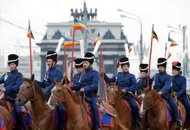Russia marks victory over Napoleon with 'march on Paris'

The commemorative horse trek spanning some 2,500 kilometres (1,560 miles) and estimated to cost $2.5 million (2.0 million euros) is supported by the Russian government and comes amid a drive to boost Russia's global standing.
Twenty-three Cossacks will retrace the Russian army's march on Paris between 1812 and 1814, passing through Belarus, Poland, Lithuania, Germany and France, part of state-orchestrated festivities to mark the 1812-1813 war.
This September, the country marks the 200th anniversary of the pivotal Battle of Borodino outside Moscow that Russian forces fought against Napoleon in 1812.
Although the epic battle was lost by Russia, it greatly weakened Napoleon's army, leading to France's eventual defeat.
The Cossacks stressed that this time they were coming in peace.
"We would like to enter Paris without horses," Alexander Kolyakin, the Cossack chief, told reporters on Sunday.
"We are not going to bayonet anyone," he quipped, adding they would like to "wash their feet in the Seine."
Starting from the Poklonnaya Gora Memorial Park in western Moscow, the expedition is expected to end in late October at Fontainebleau where the defeated French emperor famously abdicated in 1814.
President Vladimir Putin, who began his third term in May, has repeatedly promised to strengthen Russia's might on the world stage and appealed to Russians' patriotic feelings.
In a landmark campaign speech in February, Putin invoked the key Battle of Borodino, saying Russians had victory written into their "genetic code" and would not allow foreigners to meddle in their country's affairs.
The organisers sought to stress the horseback march was in no way a political statement, however.
"This event should become a symbol of solidarity of the peoples of Europe who are connected through not only economic interests but also a common history and culture," the organisers said in a statement.
"We need to pay tribute to the fallen soldiers, Russian as well as French ones," Pavel Moshchalkov, one of the organisers, told AFP.
A horse breeder, he hopes that the expedition will help raise awareness about the dwindling numbers of rare Don horses participating in the trek.
"The Don breed is dying out," he said. The organisers are hoping to stage a charity auction at Fontainebleau to help save the famously hardy riding horse.
Cities along the route of the trek will include the Belarusian capital Minsk, Kaunas in Lithuania, the Polish capital Warsaw, Leipzig in Germany and the French city of Nancy.
Some of those cities will be treated to song and dance numbers by the renowned Alexandrov Red Army Chorus and Dance Ensemble and horseback stunts by a team from the Kremlin Equestrian School, the organisers said.
A spokeswoman for the Federal Customs Service which helped organise the event said the expedition was privately funded, with donations coming from companies as well as individuals.
Alexander Bukovsky, a representative of the organisers, estimated the cost of the expedition at 80 million rubles ($2.5 million, 2.0 million euros).
Russia traditionally celebrates its military victories with pomp and grandeur. Its 1612 victory over the Polish occupiers expelled from the Kremlin is a national holiday.
What the stars mean:
★ Poor ★ ★ Promising ★★★ Good ★★★★ Very good ★★★★★ Exceptional
Latest News
More News
- Russian President congratulates Vietnamese Party leader during phone talks (January 25, 2026 | 09:58)
- Worldwide congratulations underscore confidence in Vietnam’s 14th Party Congress (January 23, 2026 | 09:02)
- Political parties, organisations, int’l friends send congratulations to 14th National Party Congress (January 22, 2026 | 09:33)
- 14th National Party Congress: Japanese media highlight Vietnam’s growth targets (January 21, 2026 | 09:46)
- 14th National Party Congress: Driving force for Vietnam to continue renewal, innovation, breakthroughs (January 21, 2026 | 09:42)
- Vietnam remains spiritual support for progressive forces: Colombian party leader (January 21, 2026 | 08:00)
- Int'l media provides large coverage of 14th National Party Congress's first working day (January 20, 2026 | 09:09)
- Vietnamese firms win top honours at ASEAN Digital Awards (January 16, 2026 | 16:45)
- ASEAN Digital Ministers' Meeting opens in Hanoi (January 15, 2026 | 15:33)
- ASEAN economies move up the global chip value chain (December 09, 2025 | 13:32)
















 Mobile Version
Mobile Version